
With the increasing demand for quality, durability, and aesthetics in kitchenware products, innovative manufacturing methods have become essential. Laser welding technology has emerged as a promising solution, offering precise and efficient welding capabilities. This article explores the innovative applications of laser welding technology in the production of kitchenware products, highlighting its benefits and examples across various types of kitchenware.
2. Laser Welding in Stainless Steel Kitchenware Manufacturing
Stainless steel kitchenware is favored for its corrosion resistance, ease of cleaning, and sleek appearance. Laser welding technology enables precise connections of stainless steel kitchenware components, eliminating defects such as porosity and deformation associated with traditional welding methods. For instance, laser welding can ensure a secure and durable connection between the handle and body of stainless steel cookware, enhancing its longevity and reliability.
3. Laser Welding in Aluminum Alloy Kitchenware Manufacturing
Aluminum alloy kitchenware, known for its lightweight and excellent thermal conductivity, also benefits from laser welding technology. By efficiently bonding aluminum alloy materials, laser welding improves production efficiency and quality stability. For example, laser welding can seamlessly join the handle and body of aluminum alloy cookware, enhancing both aesthetics and durability.

4. Laser Welding in Ceramic Kitchenware Manufacturing
As health and environmental consciousness rise, ceramic kitchenware has become a popular choice. Laser welding technology plays a crucial role in precision processing and bonding of ceramic materials, ensuring product safety and durability. For instance, laser welding can achieve a tight connection between the blade and handle of ceramic knives, improving their lifespan and cutting performance.
5. Role of Laser Welding in Kitchenware Design Innovation
Beyond manufacturing, laser welding technology fosters design innovation in kitchenware products. Its ability to process complex structures and intricate components opens up new design possibilities. For instance, laser welding facilitates personalized customization of kitchenware products, catering to diverse user preferences.
6. Conclusion
In conclusion, the innovative application of laser welding technology in kitchenware products offers new experiences and possibilities for kitchen enthusiasts. As laser welding technology continues to advance, it is poised to play an increasingly important role in kitchenware manufacturing, providing consumers with high-quality, durable products and driving the growth of the entire kitchenware industry.


